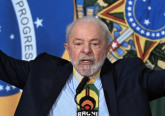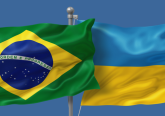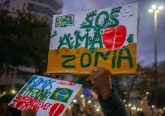On October 8th, Brazilians went to the polls to vote for a new President amid economic woes, an all-encompassing seeming corruption scandal, and, a deteriorating security situation. With the most popular candidate, former President Ignacio “Lula” da Silva, banned from appearing on the ballot due to a conviction earlier this year, and, incumbent President Michel Temer deeply disliked, controversial right-wing candidate Jair Bolsonaro became the odds-on favourite. Outperforming predictions, Bolsonaro received 46% of the votes. However, because he fell short of securing the outright majority of votes, he will face the runner-up, Fernando Haddad, who received 29% of the votes, in the second round of the elections on October 28th.
While much has been written about Bolsonaro’s affinity to and similarities with Trump, stated sympathies for Brazil’s dictatorship, incendiary remarks about women, LGBTQ communities and refugees, populist proposals lacking substantive details and even the threat he poses to Brazil’s democracy, there is another issue at stake. Brazil’s drug policy is at a crossroads, as the two candidates facing each other represent diametrically opposed approaches. Bolsonaro stands for an embrace of and doubling down on punitive measures to enforce drug prohibition, whereas Haddad stands for readjustments to extant drug policy and, as mayor of São Paulo, introduced harm reduction measures aimed to assist and rehabilitate drug users.
Punitive Prohibitionism vs. Harm Reduction
While Bolsonaro and Haddad differ on most issues, their contrasting positions on drug policy are exemplary of the stark differences in how to address drug (ab)use, production and trafficking around the world. Approaches with widely different philosophical underpinnings, policy prescriptions and eventual outcomes are solidifying as polar opposite responses to the so-called “drug problem.”
On the one hand, punitive prohibitionism sees drugs as an evil that must be eradicated. While prohibition is the norm around the world for most narcotics, punitive prohibition, as understood here, does not just rely on the penal system and law enforcement, but military and para-military forces, a disregard for due process, and even extra-judicial executions of those linked to drug. Under this version, the “war on drugs” lives up to its name, no quarter is given and much of the ius in bello is disregarded, leading to high casualties and numerous human rights violations. The paradigmatic case are the Philippines, where President Rodrigo Duterte’s administration has been responsible for killing thousands of alleged drug users and dealers.
On the other hand, harm reduction emphasises that drug users can and should be helped to reduce unnecessary suffering. Harm reduction is fundamentally pragmatic: those who are using drugs should receive help and assistance to ameliorate the circumstances and consequences of their drug use. Policy interventions, such as needle exchange programs, prescription heroin or safe injection, aim to reduce the negative consequences of addiction, but not necessarily to promote abstinence. Exemplary for innovative harm reduction measures is Switzerland, where a wide variety of interventions have been implemented.
Both within Latin America and around the world, these two fundamentally different policy “solutions,” have been employed to address the so-called “drug problem.” While some countries have become more punitive, for instance relying on the death penalty, others have liberalized their drug policies, for example decriminalizing drug possession and consumption. While these differences routinely emerge in comparisons between countries and have resulted in a fractured international consensus on how to address drugs, Brazil’s second round election pits these two approaches in direct competition within the same country.
Haddad on Drugs
Before becoming the PT’s candidate, Fernando Haddad stated in an interview that when it comes to drugs: “We’re deluding people that we’re fighting something. We’re not fighting anything. We’re losing the war. In part because this war cannot be won, if not through the promotion of health care and prevention through education.”
In his electoral platform, Haddad promises a “new drug policy” because “repressive drug policy has been erroneous, unjust and ineffective.” It bemoans the over-incarceration of non-violent offenders,[i] the subpar state of prisons[ii] and the vast sums of money drug trafficking organizations have at their disposal because of prohibition. International experiences with decriminalization and legal regulation of currently prohibited substances are to be “looked at attentively.” While the platform does call for a renewed effort to combat international drug trafficking, it also calls for more social programs and an emphasis on health and educational approaches. Explicitly, Haddad’s program proposes harm reduction measures.
In doing so Haddad’s program echoes harm reduction measures which he introduced as mayor of São Paulo (2013-2017). The program “With Open Arms” (De Braços Abertos) provided housing, food and jobs to more than 400 people in an area of São Paulo known for its open drug scene as Cracolândia (Crackland).The aim of the program was to break the vicious cycle of vulnerability, marginalization, repression and drug abuse, by trying to get drug users into employment and eventually to reduce their drug use. Haddad’s successor as mayor of São Paulo, João Doria, ended With Open Arms and replaced the innovative program with more punitive measures.
Bolsonaro on Drugs
During the campaign, Jair Bolsonaro stated: “I do not get understand the liberalization of drugs. Some say it will reduce violence and infighting between traffickers, but it won’t… Nobody wants to persecute drug users, but we will fight… with the armed forces… to really enforce prohibition.”
Despite the importance Bolsonaro has given to the topic of insecurity, his electoral platform does not reference drug policy explicitly. Rather, it stresses that the military will have “an even more important role to play” in providing security and that law enforcement officials need protection from an overzealous judiciary and impunity for carrying out their duty effectively.[iii] Furthermore, Bolsonaro’s program calls for loosening gun control measures to make it easier for Brazilians to own weapons and defend themselves.
While his political program is light on specifics regarding drug policy, past statements are a good indication of Bolsonaro’s stance. In 2011, he explained his opposition to cannabis legalization with reference to it being “the gateway to harder drugs” and “causing great harm to its users.” In 2014, Bolsonaro called a legislative initiative to liberalize access to cannabis “benefitting traffickers, rapists and hostage takers.” And, long before running for President, Bolsonaro wrote a letter in support of the Indonesian government for sentencing a Brazilian drug trafficker to the death penalty. While such positions are not necessarily unusual for a conservative politicians, Bolsonaro has made more fanciful statements regarding drugs in the past as well, for instance, he has said that drug use is responsible for turning young men gay.
Most worrying, however, is Bolsonaro’s support of employing the military and extra-judicial executions. Indeed, Bolsonaro has not only been frequently compared to Duterte for his mano dura proposals, disregard for due process and infatuation with the military, but Bolsonaro himself has defended Duterte as “doing the right thing for his country” and “advocated the possibility of unbridled state violence” in an interview. If Brazil reached a similar level of violence to the Philippines, he said, “you’d have to take action.”
Conclusions
It appears that Brazilians have already made up their mind and will vote for Bolsonaro to occupy the Planalto presidential palace. This will not only open the doors for a politician, whom the New York Times has called an “offensive, crude and thuggish populist,” The Economist “a threat to democracy,” and, Die Zeit “a sympathizer with “military dictatorships and torturers” who has “openly expressed fascist ideas,” but the election will also set the future direction of Brazil’s drug policy. With Bolsonaro in power, it is highly likely that draconian measures carried out by the military with complete disregard for human rights will be employed in a further escalation of Brazil’s already bloody “drug war.” Paraphrasing Brazil’s motto “ordem e progreso,” punitive prohibitionism is going to be the order of the day, but if experiences from elsewhere and other times are any indication, little progress in reducing the so-called “drug problem” will be made.
[i] Convictions for simple possession of drugs have contributed to Brazil having the fourth highest incarceration rate worldwide.
[ii] Brazilian prisons are notorious for violence, overpopulation, human rights abuses and control of organized gangs.
[iii] Advocating for less accountability is highly controversial proposal considering the well documented prevalence of police violence and killings in Brazil.






